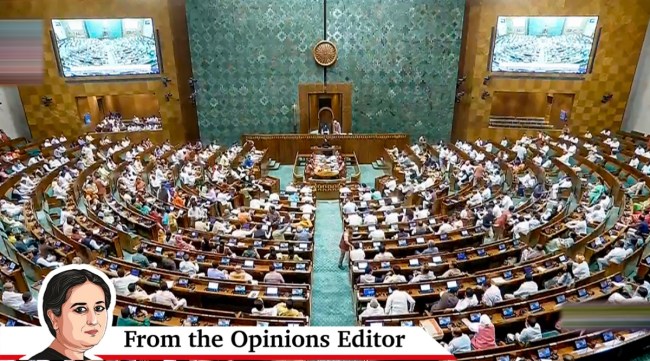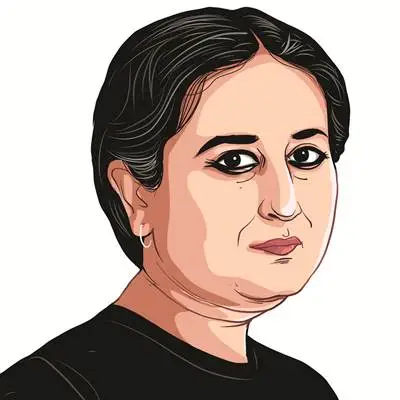Opinion Vandita Mishra writes | Women’s Bill and Ramesh Bidhuri’s hate speech: Join the dots
The Bill’s promise of greater representation is undermined by the unabashed and unchecked intolerance of the BJP MP
 In the special session of parliament, a historic legislation was passed, and a hate speech was made (PTI Photo)
In the special session of parliament, a historic legislation was passed, and a hate speech was made (PTI Photo) Dear Express Reader,
The week of the special session of Parliament is over, leaving in its wake one big story and several post-scripts. The passage of the Women’s Reservation Bill, its near unanimous endorsement by political parties in both Houses, almost three decades after it was first tabled, is the big story. The delay inserted in the Bill by linking it to the next census and the delimitation after that, their timing still indeterminate, and the shocking hate speech by a BJP MP in Parliament, are two of the stories that were rendered post-scripts.
This format is not incidental. A large and overarching idea captures the imagination and takes centrestage, and it makes the questions and apprehensions about its implementation, timing, design and mechanisms of accountability, secondary. It also overwhelms and overtakes other issues that might be unfavourable to the ruling establishment.
This is not to suggest an impossible conspiracy — the BJP is unlikely to have predicted the fracas with Canada or MP Ramesh Bidhuri’s ugly outburst in the House in the same week as it pushed through the Women’s Bill. It is to point out that the special session called to pass the Women’s Bill was intended as an argument-stopper, and that it had the intended effect — of shock-ing and awe-ing and dominating the conversation. The Modi-BJP has made a habit of doing this regularly.
Be it demonetisation, abrogation of Article 370, Balakot air strike, or the setting up of the One Nation One Election committee — big moves all, made suddenly. In each, the big-ness seemed to insulate it against a nuts-and-bolts questioning. In the case of demonetisation, for instance, whose very real consequences discomfited large sections of the citizenry, the ambition and risk-taking of the measure made the obvious failures of its operationalisation seem small in comparison to many.
In effect, if all goes according to the BJP’s plan, in 2024, the battle will be between Modi, the mover and shaker who is still moving and shaking versus his opponents, naysayers and status quo-ists. Not, as the INDIA alliance would have it, between a government facing an Opposition more united and a two-term anti-incumbency.
Of course, the women’s bill is far more consequential than just a rabbit the Modi government, ahead of 2024, has pulled out of its hat. By itself, whenever it is implemented, it will help address a grave injustice done to women, and touch off a transformation that will benefit everyone, both women and men.
More women MLAs and MPs may or may not make our legislatures kinder and gentler or more compassionate. But they will make them more representative and inclusive, and therefore, fuller and richer in terms of the talent and resources they are shaped by, and draw upon.
Many years ago, after one of the previous unsuccessful outings of the women’s bill in Parliament, I travelled to its then prominent critic Mulayam Singh Yadav’s bastion in UP, to report on the implementation on the ground of the women’s quota in panchayat elections. Was the empowerment real, and to what extent was it hijacked by the phenomenon of the sarpanch-pati, the powerful husband of the elected woman sarpanch who pulled all the strings?
I still remember the quiet resolve in the eyes of one woman sarpanch, who said that she would remain in politics even after her term was over and contest an MLA election eventually. She spoke sotto voce, sitting on a cot in a dimly-lit room, while her husband loudly held court in the sun outside. “I let him think he is in charge so that there is less friction”, she whispered. Another woman sarpanch, frying pooris, told me how much she enjoyed the new visibility that being a sarpanch gave her outside her home. She didn’t have a plan yet for after her term was over, she said, but “things can’t go back to what they used to be…”.
There is no doubt that the reservation of seats for women in Parliaments and state legislatures will unlock spaces at the top that will reinforce the forces of change welling up from below, and the entire polity will benefit as a result.
Ahead of 2024, then, the Opposition must contend with a government that is still unleashing big changes, or promising to, making it that much more difficult to trip it on its past record and anti-incumbency. The Opposition will need to combat the government’s big ideas with big ideas of its own, its ambitious agenda with an ambitious agenda of its own — or else, risk being labelled as carping and negative.
But beyond the calculus of government or the Opposition’s challenge, and the genuinely virtuous cycles that will be set in motion by the women’s bill, is a disturbing image, or video.
That Ramesh Bidhuri should, in the highest forum of deliberation and debate, hurl communal slur and invective at a fellow “Muslim” MP, and that in the aftermath, there should be only a war of letters which, on the BJP’s side, is filled with whataboutery, that the passage of the Women’s Bill should become the big story that ends up trumping and sidelining Bidhuri’s hate speech, the Bill’s promise of greater representation undermined by the unabashed intolerance of the BJP MP — is a symptom of an all-round debasement and a travesty.
Till next week,
Vandita
Must Read Opinions From the Week:
*Editorial, “Quote unquote Bidhuri”, September 23
*Amarinder Singh, “When I met Trudeau”, September 23
*Editorial, “Agree to agree”, September 22






